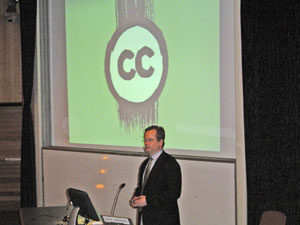 Lessig and LogoAfter these introductions we're now moving on to Lawrence Lessig's keynote. His aim today is to place the CC movement in some context, to provide a motivation for the project. His main theme, therefore is 'remix', and he notes that culture itself is remix, every day - from politics to the arts: we decide what to consume and what to construct and (re)create from this input. The main observation here is that this form of remix is free: unregulated by law; there is no requirement for permission to be able to do this. In fact, it needs to be free in order to avoid infantilising our culture, to ensure the basic human right of being able to 'write' our culture in ordinary ways
Lessig and LogoAfter these introductions we're now moving on to Lawrence Lessig's keynote. His aim today is to place the CC movement in some context, to provide a motivation for the project. His main theme, therefore is 'remix', and he notes that culture itself is remix, every day - from politics to the arts: we decide what to consume and what to construct and (re)create from this input. The main observation here is that this form of remix is free: unregulated by law; there is no requirement for permission to be able to do this. In fact, it needs to be free in order to avoid infantilising our culture, to ensure the basic human right of being able to 'write' our culture in ordinary ways
Our technology today remains grounded in text and words, in remixing text and words - and that technology is free, as a result of a 400-year tradition. It isn't totally free in the sense that libel and attribution laws apply, but nonetheless the idea that 'writing is allowed' in our culture remains deeply held. Indeed, culture and education are all about our ability to remix in order to understand and know, and to express our own thoughts.
But the technology is changing: our ordinary ways of engaging in this remix are changing through the rise of digital technology. Examples are music and film, but also politics (and he's showing some remixed news footage and political statements to make that point). This is digital creativity which changes what it means to write, to remix culture: changing the creative as well as the democratic potential of our culture. It's a bottom-up, blog, peer-to-peer democracy - or at least the potential for one.
How do we understand that potential? We must see it in the way our kids experience new technology, and use it to remix culture: for them, this kind of remixing is as natural as it is for us when we do the same with words. While for us the idea of a consumer culture lives on, they have moved into a user culture, which is active, dynamic, and creative. What happens when that creative literacy goes mainstream, becomes the driving force of our cultural activity, where it is 'ordinary'?
The problem with that future is that such forms activity are basically illegal at this point. Remix is illegal because of an explosion in the scope and reach of law; such laws say that permission is required for remixing, and that permission is not forthcoming. The same technology that enables the new digital remix, after all, also enables intellectual property 'piracy' - and for the major IP holders the struggle against 'piracy' has become a 'terrorist war' (as the MPAA's Jack Valenti has put it). Law and technology have combined to fight this war (largely against the next generation of content users), in the process killing off a possible creative future.
This is not an argument against IP; it is not a defence of 'piracy': it is an argument against the IP war itself because it criminalises the next generation of content creators and undermines their belief in democracy. It also means that the new creative literacy is not able to be taught in schools, which has significant long-term consequences. Further, if additional digital rights protection measures are developed and implemented then the technology itself will take away the potential to engage in creative digital expression, making remixing impossible.
The solution at present is a combination of strong DRM mixed with liberal 'fair use' provisions (enabling home users to make additional copies of their CDs for private use, for example), but this does not address the core issue of being able to remix content and to make further use of that content (e.g. sharing it with others). It is a lawyer-centred regime of copyright, which pushes the user back into a couch-potato consumer role again. Unfortunately, there is extremism on both sides of the debate, from the 'terrorist war' against IP abuse to a complete, outright rejection of IP in general. Both extremisms are wrong; there is a kind of 'IP McCarthyism' where anyone attempting to begin a new debate around IP is branded a 'communist'.
So, how can remixing be allowed to occur without threatening intellectual property? The answer is the Creative Commons, of course. Its licences combine human-, lawyer-, and machine-readable licences without requiring the constant intervention of lawyers in the process of using and remixing CC-licenced IP. The creative commons aims to do exactly that - establish a commons for IP which enables the use of that content without ignoring the continuing legal and moral rights of the content creator.
A new project in this context is the Science Commons - open-access publishing, databases, and patents which enable open scientific innovation. Another idea currently underway is a business commons. However, of course there remains a significant opposition from the major IP holders' organisations, such as the RIAA, the MPAA, and especially also international copyright lawyers' organisations (Bill Gates's recent interview, labelling CC advocates as 'communists', ins instructive here). Again, the CC project does not aim to 'kill' IP, but to bring the concept into the 21st century.












